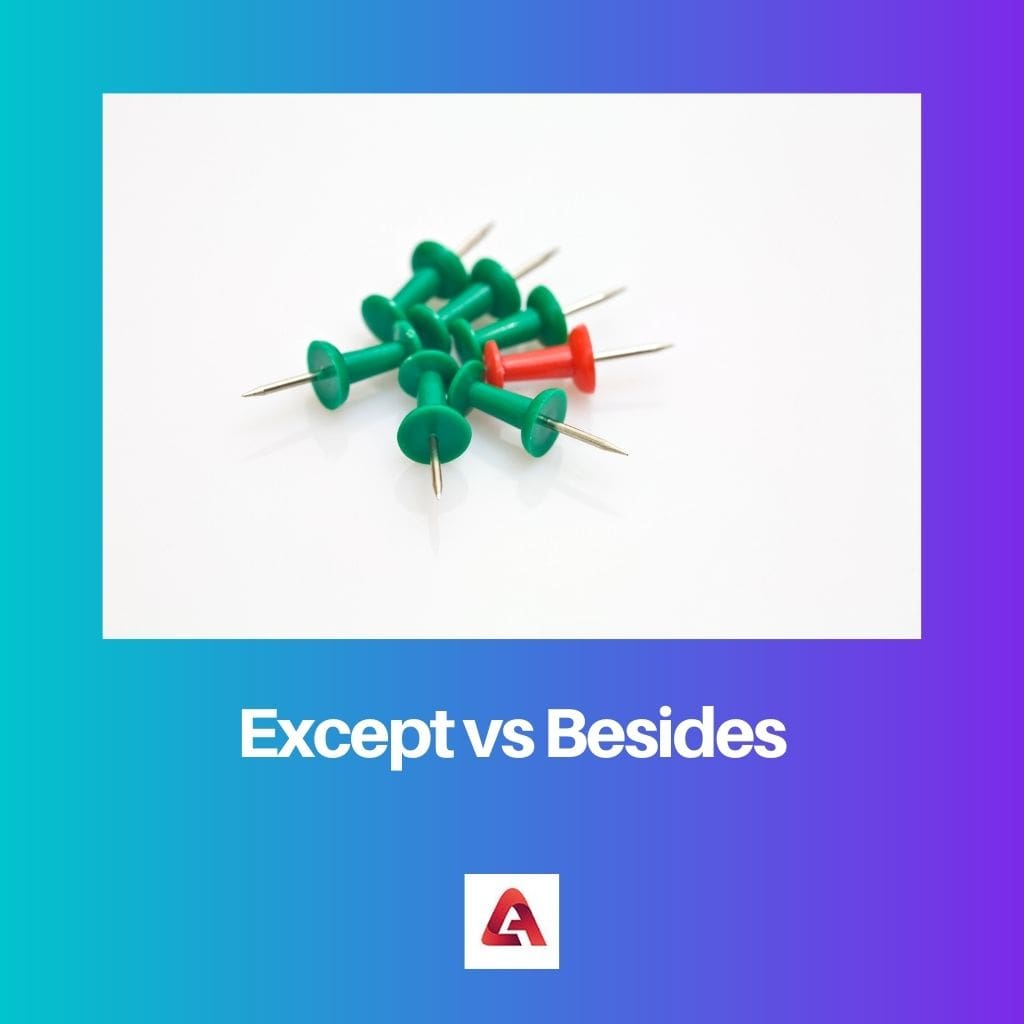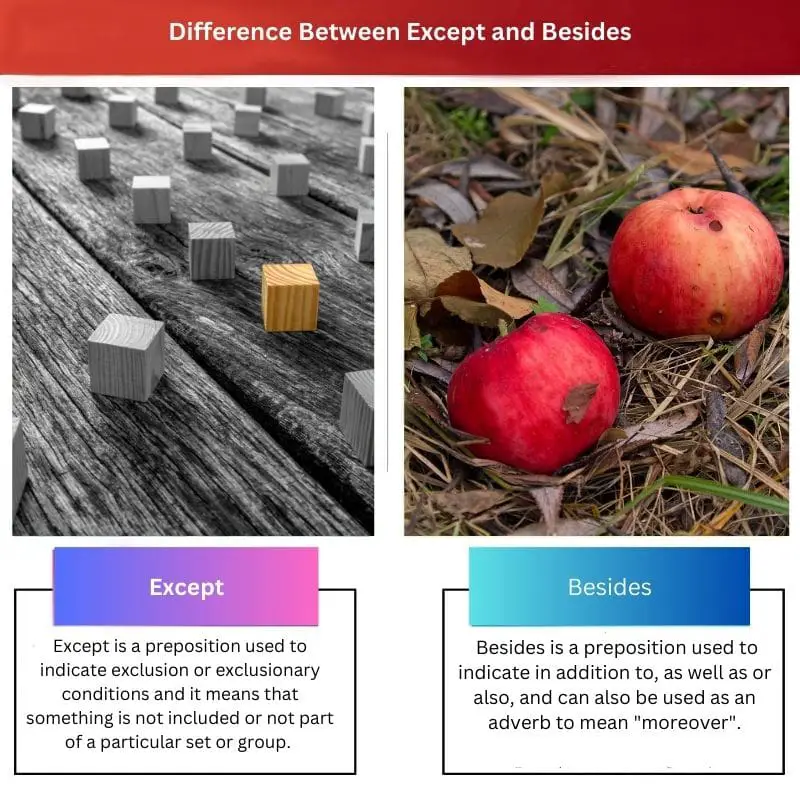Every language has a different set of rules to speak and write, and English is one of the tricky languages. Sometimes even native speakers also make grammatical errors while speaking and writing.
For any language, grammar is the base for writing and speaking; the rules and systems we follow to write and speak are called Grammar.
Key Takeaways
- Meaning: “Except” is used to exclude something from a group or category, while “besides” implies the inclusion of additional items or ideas.
- Context: “Except” highlights an exception or exclusion, whereas “besides” emphasizes additional elements or alternatives.
- Examples: “All the fruits are ripe except the apples” (excluding apples); “I like all fruits besides apples” (including apples and others).
Except vs Besides
Except is a preposition used to indicate exclusion or exclusionary conditions and it means that something is not included or not part of a particular set or group. Besides is a preposition used to indicate in addition to, as well as or also, and can also be used as an adverb to mean “moreover”.

Connecting the two parts of the sentence, words and clauses are called a conjunction. ‘Except’ is also a conjunction.
‘Except’ is a preposition following the noun and a conjunction following a Clause or adverb phrase. Except is used to exclude something from the sentence.
Comparison Table
| Parameter of Comparison | Except | Besides |
|---|---|---|
| Function | It excludes an entity, situation, or individual from the sentence. For E.g. 1. All came to the party except James. 2. I teach mathematics except for calculus. | It includes an entity or a situation, or an individual from the sentence For E.g. 1. Besides James, all came to the party. 2. I teach mathematics besides English. |
| Meaning | ‘Except’ means, apart from | ‘Besides’ mean, in addition to. |
| Statement Type | Rejection Statement. ‘Except’, while used, gives a recommended rejection. | Addition Statement. ‘Besides’, while used, gives a recommended addition. |
| Part of the sentence | In a sentence, except can feature at the start or middle. | Besides shall feature in all parts of the sentence. |
| Statement Intensity | ‘Except’ Reduces intensity when used in negative sentences. For E.g. 1. He had a terrible day except that he had met his girlfriend. | ‘Besides’ Improves or Increases intensity while used in negative sentences. For E.g. 1. He had a terrible day; besides, he met his ex-girlfriend on the way home. |
| Tense Forms | When used in other tense forms, the form and spelling of the word change as per the tense, for E.g. 1. Excepted 2. Excepting 3. Excerpts | It does not change its spelling or form in any tense form. |
When to Use Except?
Except Preposition followed by nouns, pronouns, conjunction followed by clauses, and adverb Phrases. It expresses people, things, location, duration, and reasons.
Expect explains a particular ‘thing’, ‘person’, and ‘others’ by excluding it from the sentence. The word can be used in the beginning and middle, followed by the noun and pronoun. It can be used in all forms of tenses.
For E.g.
- I like to do all the house chores except washing clothes.
- The coffee shop will be open daily except for Sundays
‘Except’ or ‘Except for’ is used in general statements like all, everyone, nobody, every, no, and whole after generalizing words. Both forms of use are correct.
For E.g.
- I like all fruits except for Kiwi
- I like all fruits except kiwi
- I like fruits except for the kiwi
Except is also used to introduce someone in the sentence by excluding them.
For E.g.
- Everyone was dancing well except for Shiny.
- All the students were in uniform except John.

When to Use Besides?
Besides is a preposition and linking adverb, which means in addition to or also or as well. If Besides is used as a linking adverb, then while writing, we put a comma before and after besides.
Besides, it is something additional to a sentence that has already been stated, besides suggesting that the addition of nature is an afterthought.
For E.g.
- Do you play any other sports besides Cricket?
- What other forms of dance do you like besides salsa?
Besides and Besides seem similar, but the meaning and use forms differ. Beside is a word with no S, which is used only as a preposition, followed by a noun, which means next to or compared to.
She was sitting beside him during a meeting.
Besides, a word that ends with the letter S is used as a preposition and linking adverb, which means an addition to the sentence with an already stated nature.
For E.g.
- She wants to travel to other places besides Paris.
- She wants to eat all flavours of Ice cream beside the black currant.

Main Differences Between Except and Besides
- The main difference between Except and besides is the actual nature of the word. ‘Except’ excludes someone or something, while ‘Besides’ includes someone or something.
- ‘Except’ statements strongly reject an entity from the situation. Whereas ‘Besides’ statements enormously add an entity to the situation.




